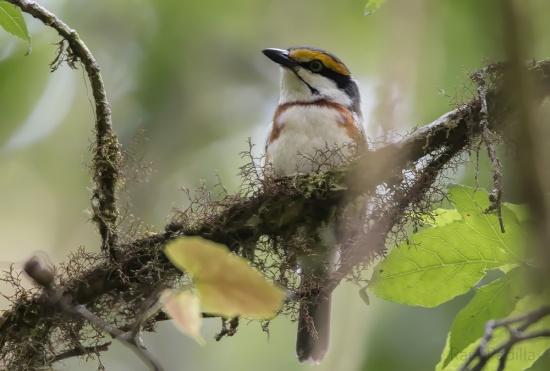(All categories completed) |
(Picture added. Some extra info. References updated) |
||
| (One intermediate revision by the same user not shown) | |||
| Line 1: | Line 1: | ||
| − | + | [[Image:Vireolanius 1.jpg|thumb|550px|right|Photo by {{user|Raul+Padilla|Raul Padilla}}<br />Tlanchinol, [[Mexico]], May 2016]] | |
;[[:Category:Vireolanius|Vireolanius]] melitophrys | ;[[:Category:Vireolanius|Vireolanius]] melitophrys | ||
==Identification== | ==Identification== | ||
| − | + | 16·5–18 cm (6½-7 in)<br /> | |
| + | Large bill<br /> | ||
| + | '''Male''' | ||
| + | *Bluish-grey crown, nape and upper mantle | ||
| + | *Olive-green on rest of upperparts | ||
| + | '''Female''' | ||
| + | *Paler | ||
| + | *Narrower chestnut breast bar | ||
| + | *Smaller chestnut areas on flanks and breast sides | ||
==Distribution== | ==Distribution== | ||
| − | [[Guatemala]] | + | [[Central America]]: found in [[Mexico]] and [[Guatemala]]. |
| + | ==Taxonomy== | ||
| + | ====Subspecies==== | ||
| + | There are 2 subspecies<sup>[[#References|[1]]]</sup>: | ||
| + | *''V. m. goldmani'': | ||
| + | :*Oak forests of south central [[Mexico]] | ||
| + | *''V. m. melitophrys'': | ||
| + | :*Southern [[Mexico]] (south-eastern Chiapas) to southern [[Guatemala]] | ||
| − | + | Two additional subspecies ''crossini'' and ''quercinus'' are not recognised by most authorities<sup>[[#References|[2]]]</sup>. | |
| − | |||
==Habitat== | ==Habitat== | ||
| − | Pine-oak | + | Pine-oak woods, open scrub to tall, dense, humid or cloud forest. |
==Behaviour== | ==Behaviour== | ||
| + | ====Breeding==== | ||
Both sexes build the nest from grass, leaves, lichen and spiders web suspended from a branch. | Both sexes build the nest from grass, leaves, lichen and spiders web suspended from a branch. | ||
| − | + | ====Diet==== | |
| − | The diet | + | The diet consists of arthropods, such as caterpillars, wasps, grasshoppers and beetles; they also eat some seeds. |
==References== | ==References== | ||
| − | elibrary | + | #{{Ref-Clements6thAug15}}#Handbook of the Birds of the World Alive (retrieved June 2016) |
| + | #elibrary | ||
| + | {{ref}} | ||
==External Links== | ==External Links== | ||
{{GSearch|Vireolanius+melitophrys}} | {{GSearch|Vireolanius+melitophrys}} | ||
| − | [[Category:Birds | + | [[Category:Birds]] [[Category:Vireolanius]] |
Latest revision as of 22:36, 2 June 2016
- Vireolanius melitophrys
Identification
16·5–18 cm (6½-7 in)
Large bill
Male
- Bluish-grey crown, nape and upper mantle
- Olive-green on rest of upperparts
Female
- Paler
- Narrower chestnut breast bar
- Smaller chestnut areas on flanks and breast sides
Distribution
Central America: found in Mexico and Guatemala.
Taxonomy
Subspecies
There are 2 subspecies[1]:
- V. m. goldmani:
- Oak forests of south central Mexico
- V. m. melitophrys:
Two additional subspecies crossini and quercinus are not recognised by most authorities[2].
Habitat
Pine-oak woods, open scrub to tall, dense, humid or cloud forest.
Behaviour
Breeding
Both sexes build the nest from grass, leaves, lichen and spiders web suspended from a branch.
Diet
The diet consists of arthropods, such as caterpillars, wasps, grasshoppers and beetles; they also eat some seeds.
References
- Clements, J. F., T. S. Schulenberg, M. J. Iliff, D. Roberson, T. A. Fredericks, B. L. Sullivan, and C. L. Wood. 2015. The eBird/Clements checklist of birds of the world: v2015, with updates to August 2015. Downloaded from http://www.birds.cornell.edu/clementschecklist/download/
- Handbook of the Birds of the World Alive (retrieved June 2016)
- elibrary
Recommended Citation
- BirdForum Opus contributors. (2024) Chestnut-sided Shrike-Vireo. In: BirdForum, the forum for wild birds and birding. Retrieved 12 May 2024 from https://www.birdforum.net/opus/Chestnut-sided_Shrike-Vireo




